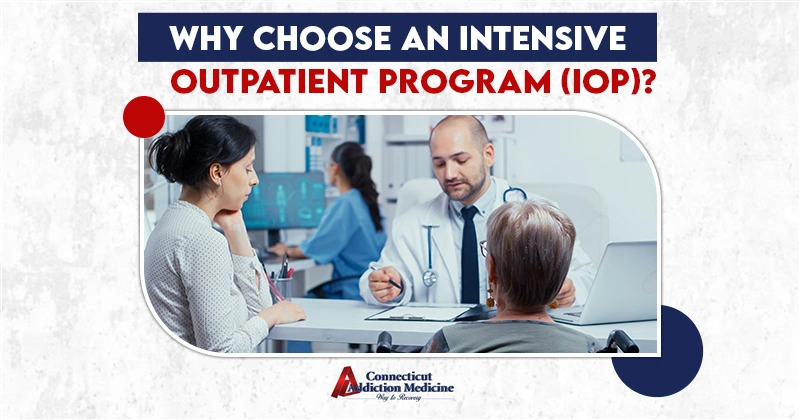An intensive outpatient program (IOP) is a program developed for individuals that require systematic therapy and support for mental health and/or substance use disorder treatment without the necessity of residing in a treatment center on a full-time basis.
An IOP allows individuals to live and focus on their responsibilities (work, family, or school) during the day, and also engage in professional treatment several times per week.
For instance, those overcoming alcohol use disorder often say the intensive outpatient alcohol treatment provided them with the means to cope with their cravings while continuing their daily lives.
The intensive outpatient program at CT Addiction Medicine enables individuals to take back their lives while having dependable medical and emotional support.
What Is an Intensive Outpatient Program (IOP)?
A structured system of treatment that occurs regularly in a day setting is called an intensive outpatient program. This treatment option serves as an intermediary between inpatient rehab and traditional outpatient therapy.
The frequency of treatment sessions typically averages from 9 hours to as many as 20 per week, of course, depending on the needs of the patient.
Key features include:
- Therapy sessions (individual and group)
- Education on relapse prevention
- Support for mental health and addiction
- Family involvement when needed
This combination helps patients stay accountable, improve mental health, and prevent relapse.
How Does an IOP Work?
Structured Therapy Sessions
Patients participate in therapy sessions with a licensed trauma-informed professional. Therapy sessions may address issues associated with both addiction and mental health disorders .
Flexible Scheduling
While in the IOP, that structure will include morning, afternoon, or evening options that can fit into a busy lifestyle.
Medical and Psychiatric Care
An IOP may include aspects of medication management, especially for those individuals with a co-occurring disorder such as anxiety and/or depression.
Benefits of Choosing an IOP
Flexibility
Patients can attend sessions while continuing work or school.
Cost-Effective
An intensive outpatient treatment plan is often more affordable than inpatient care because it doesn’t include housing and meals.
Strong Support System
Peers and therapists form a network of support that helps patients stay motivated.
Real-Life Application
Because patients go home daily, they can immediately practice new coping strategies in real environments.
Who Should Consider an IOP?
An IOP program is suitable for:
- People with mild to moderate addiction
- Patients transitioning from inpatient rehab
- Individuals needing structured therapy but with strong home support
- Those who want to maintain work or school commitments
Different Types of IOP Programs
Intensive outpatient therapy
Concentrates on counseling to help individuals with emotional difficulties, trauma, and mental health difficulties.
Intensive outpatient treatment
Provides a mix of therapy, life skills, and relapse prevention in terms of long-term recovery.
Intensive outpatient alcohol treatment
Specialized treatment for individuals with alcohol use disorder (AUD), exact location for detox support and relapse prevention.
Intensive outpatient program alcohol
This is specifically designed for patients with alcohol dependency who need continued and structured care but do not require inpatient care.
What to Expect at CT Addiction Medicine’s IOP
At CT Addiction Medicine, we provide personalized intensive outpatient treatment that combines medical expertise with compassionate care.
Our program includes:
- Individual therapy sessions
- Group support
- Medication management if needed
- Family therapy
- Skills training for stress management and relapse prevention
Challenges and How to Overcome Them
Patients may face challenges such as:
- Balancing treatment with personal responsibilities
- Stigma associated with seeking help
- Risk of relapse at home
Overcoming these challenges involves:
- Strong family and peer support
- Consistent communication with therapists
- Using coping skills taught in the program
Conclusion
Selecting an intensive outpatient program is one of the best ways to move toward recovery for individuals that need a little structure but are not able to go to an inpatient program. IOPs provide a fantastic middle ground between both independence and professional support including people who need to attend to work/school or need to take care of their families but want to prioritize their own health.
With the benefit of therapy sessions, peer support, and medical care, patients continue to grow healthier lifestyles in the world around them. A patient can be in an intensive outpatient therapy, intensive outpatient treatment, or intensive outpatient alcohol treatment program, all of which are designed for unique recovery needs.
CT Addiction Medicine is dedicated to walking our patients through the many steps of recovery. Our intensive outpatient program approaches addiction and mental health for patient’s long-term success in a thoughtful, compassionate, and evidenced-based manner.
FAQs
Q.What is an intensive outpatient program?
An intensive outpatient program involves structured treatment, where a patient has therapy for substance use disorder and lives in their own home.
Q.What is the target population of an intensive outpatient treatment plan?
Those who have a mild to moderate addiction, desire structure, but are still balancing daily life.
Q.Is intensive outpatient program mental health effective for depression or anxiety?
Yes, many IOPs will also contain therapy focused on co-occurring mental health disorders.

